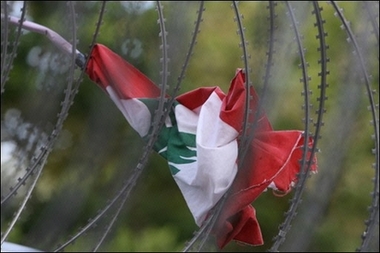 by Henri Mamarbachi, BEIRUT (AFP) – Tensions ran high in Lebanon after a Shiite was killed in a Beirut street fight near a mass rally against the Western-backed government, stoking fears of a descent into sectarian strife.
by Henri Mamarbachi, BEIRUT (AFP) – Tensions ran high in Lebanon after a Shiite was killed in a Beirut street fight near a mass rally against the Western-backed government, stoking fears of a descent into sectarian strife.
The killing in a pro-government neighborhood was the first violent incident since the launch of the open-ended protest on Friday, threatening to take an already heated cauldron of political division to boiling point.Hundreds of army troops were manning armored vehicles on every street corner of the district where the clashes erupted, while at the protest, Hezbollah’s civilian-clothed security men were maintaining a tight grip on the crowds."Arab countries cannot stand by and watch a situation that could get worse," said Arab League chief Amr Mussa after meeting President Emile Lahoud.
Hezbollah has spearheaded the protest against a government it accuses of being corrupt, weak and no longer representative of the Lebanese people after six pro-Syrian ministers resigned last month. Prime Minister Fuad Siniora’s government has dug in its heels, insisting that only talks, not protest, can solve Lebanon’s political crisis. But the opposition has vowed to continue the demonstration until the government falls
Tens of thousands of people flocked to the protest again on Monday, waving flags and calling for the Siniora cabinet to resign in a show of force led by Shiites and also Christians disillusioned with the government.
Protesters carried the coffin of the young man who was killed Sunday to the rally after dark Monday, to cries of "Martyr!"
A tent city decorated with portraits of Hassan Nasrallah, head of the Syrian-backed Hezbollah, and other opposition figures has been set up on two squares near government offices for protesters to camp out overnight.
Loudspeakers blared Hezbollah war hymns within earshot of the government offices as protesters waved Lebanese national flags, a sign of the political clout Hezbollah gained after its July-August war with Israel.
"It’s forbidden to make any trouble," said Hussein Fadlallah, the Hezbollah supervisor of the sprawling tent city which has seen no incidents of violence.
Anti-Syrian parliamentary majority leader Saad Hariri urged his supporters to "stay calm" and "not to respond to provocation" as other government leaders pledged to wait out the protest until talks can resume.
Tensions spiked in the Kaskas neighborhood of Beirut late Sunday, after a convoy of opposition supporters drove through the area, sparking a street fight that saw a 20-year-old pro-Syrian Shiite die later of his wounds.
An opposition statement urged a larger and continued peaceful turnout at the rally in response to the fall of the "first martyr".
In Damascus, German Foreign Minister Frank-Walter Steinmeier called for the Syrian leadership to do "everything it can to prevent the destabilization" of neighboring Lebanon.
With troops and anti-riot police deployed in force around Beirut to keep the peace, the Siniora government has received strong public backing from Western and some moderate Arab states.
Egypt’s ambassador to Beirut met Monday with both Hariri, a Sunni, and the Shiite parliament speaker, Nabih Berri, urging Lebanese leaders to avoid an outbreak of the type of Muslim inter-confessional strife plaguing Iraq.
"A deterioration of the situation to the point of clashes between Sunni and Shiites would not be in the interests of anyone," Hussein Darrar told reporters, calling for constitutional means to resolve the crisis.
The Saudi government, meanwhile, urged the Lebanese to safeguard their unity through dialogue, warning that continued differences would undermine the independence of their country.
Jordan’s Foreign Minister Abdel Ilah Khatib visited Beirut on Monday in a show of solidarity with the Siniora government.
The deadlock threatens to block the government’s legislative program, including its centerpiece plans for an international tribunal to try suspects in the 2005 murder of former premier Rafiq Hariri, widely blamed on Syria.
On the economic front, EU foreign policy chief Javier Solana warned Monday that an international aid conference next month could fail if all Lebanese factions do not work together closely to prepare it.
The conference aims to secure long-term assistance to help Lebanon recover from the Israel-Hezbollah conflict which caused more than 3.5 billion dollars (2.6 billion euros) in damage.



